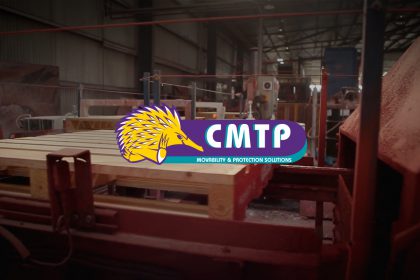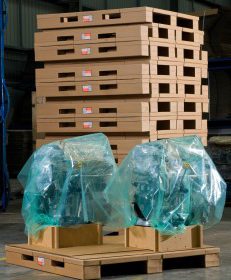If you’re shipping products internationally, using the right pallets isn’t just a best practice, it’s a legal requirement. One of the most important global standards for wooden packaging is ISPM-15.
Whether you’re a logistics manager or a business owner preparing for export, this guide breaks down everything you need to know about ISPM-15 certified pallets and how CMTP ensures your shipments meet all international regulations.
What Is ISPM-15?
ISPM-15 stands for International Standards for Phytosanitary Measures No. 15. It was developed by the International Plant Protection Convention (IPPC) to prevent the spread of pests and diseases through wooden packaging materials used in global trade.
This standard requires that all solid wood packaging including pallets, crates, dunnage, and cable reels must be:
- Treated by heat or fumigation
- Marked with a certified IPPC stamp
- Free from bark, pests, or signs of infestation
ISPM-15 is mandatory in 180+ countries, including the USA, Canada, the EU, China, Japan, and Australia.
Why Is ISPM-15 Compliance So Important?
Non-compliant pallets can lead to:
- Shipment rejection at borders
- Fines or delays from customs
- Infestation risks that affect your business and the receiving country
- Damage to your supply chain reputation
Using ISPM-15 certified pallets protects both the global ecosystem and your bottom line. It proves that your company takes compliance, hygiene, and sustainability seriously.
What Makes a Pallet ISPM-15 Certified?
To meet ISPM-15 standards, wooden pallets must undergo one of the following treatments:
Heat Treatment (HT)
- Wood is heated to a core temperature of 56°C for at least 30 minutes
- The most common and eco-friendly treatment method
Methyl Bromide Fumigation (MB)
- Wood is fumigated with methyl bromide gas
- Less common due to environmental concerns and phase-out in many countries
Once treated, the pallet is marked with the IPPC stamp, which includes:
- Country code (e.g., AU for Australia)
- Unique certification number
- HT or MB symbol
- IPPC logo
Example: AU-0123 HT
This mark confirms that the pallet is safe and legal for international shipping.
What Types of Pallets Can Be ISPM-15 Certified?
Only solid wood packaging requires ISPM-15 certification. That includes:
- Hardwood and softwood pallets
- Wooden crates and boxes
- Timber dunnage
- Wooden cable reels
Materials like plastic pallets, plywood, particleboard, and composite wood are exempt from ISPM-15, as they are processed in ways that remove pests during manufacturing.
CMTP’s Export Pallets: Fully ISPM-15 Compliant
At CMTP, we supply ISPM-15 certified export pallets from our fully accredited facilities. Each pallet is:
- Treated using HT methods at government-approved kilns
- Stamped with the IPPC mark and traceable back to our mill
- Manufactured to Australian and international size standards
- Available in standard and custom sizes
- Designed for high-load, high-stability applications
Our pallets are ready for shipment to over 180 countries. We can also supply custom-certified wooden crates for irregular or high-value exports.
View our ISPM-15 certified pallet range
What Happens If You Ship Without ISPM-15 Pallets?
If your shipment includes untreated or uncertified pallets, customs can:
- Detain your goods
- Require re-packaging at the border (expensive and slow)
- Refuse entry and return the shipment
- Impose fines and increase inspection frequency
In short, cutting corners on pallet compliance can cause massive delays, loss of revenue, and harm to your customer relationships.
Who Should Use ISPM-15 Certified Pallets?
- Exporters in manufacturing, food, or pharma
- Businesses shipping to the US, EU, UK, and Asia
- Third-party logistics (3PL) companies
- Warehouse and supply chain managers
- Packaging contractors for high-value machinery
If your business involves international logistics, using certified pallets is not optional — it’s required.
Common Misconceptions About ISPM-15 Pallets
Many businesses assume that all wooden pallets are export-ready, but that’s far from the truth. Not all treated pallets are certified, and not all certified pallets are treated in the same way. For example, some suppliers may provide heat-treated pallets without the proper IPPC stamp, which renders them non-compliant. It’s critical to verify both the treatment process and certification to avoid shipment issues.
Another misconception is that once a pallet is certified, it can be reused indefinitely. In reality, any modification to a pallet, such as cutting or repairing it with untreated wood, invalidates its ISPM-15 certification and requires re-treatment and re-stamping.
How to Identify a Certified Pallet
Understanding the IPPC stamp format helps you verify pallet compliance quickly. Every certified pallet must display:
- A country code (e.g. AU for Australia)
- A facility code unique to the treatment provider
- The treatment method (HT for heat treatment or MB for methyl bromide)
- The IPPC wheat symbol
If this mark is missing or partially obscured, the pallet should not be used for export. CMTP ensures clear, permanent markings on every certified pallet.
Environmental Considerations and Alternatives
While ISPM-15 focuses on wooden packaging, some businesses may opt for plastic pallets as an alternative. These don’t require certification, but they come at a higher upfront cost and may not be suitable for all loading requirements. Additionally, plastic pallets may not align with sustainability goals if they are not recycled or reused properly.
CMTP helps clients evaluate whether heat-treated timber or other alternatives best suit their export and environmental needs.
CMTP’s Turnkey Export Solutions
Beyond pallets, CMTP offers full-service solutions for exporters, including:
- Custom crates and reinforced boxes
- Heat-treated dunnage and baseboards
- On-site packaging by mobile teams
- Contract packaging services to prep entire shipments at your facility
Explore our contract packaging services to simplify export compliance from day one.
Final Thoughts
Shipping overseas? Don’t risk rejection, delays, or compliance failures. With ISPM-15 certified pallets, you ensure that your products are protected, legal, and welcome at any global port.
CMTP makes exporting simple, secure, and compliant. We’re trusted by hundreds of Australian exporters to supply the right pallet every time. Need export-ready pallets? Get a quote for ISPM-15 certified pallets from CMTP today.


